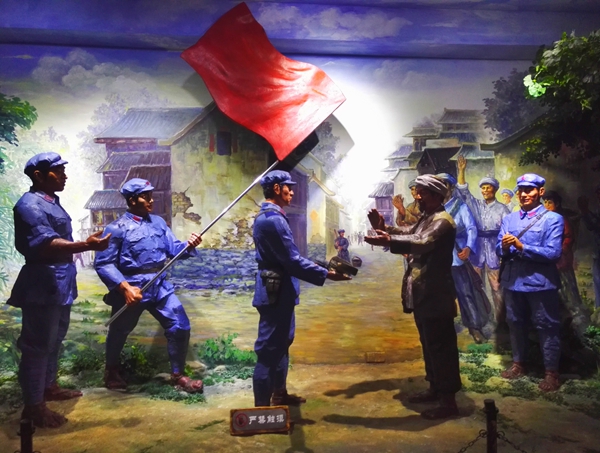
 |
|
A scene reflects the story between local people and Red Army in Weng'an county in Guizhou province. [Photo by Zhang Xingjian/chinadaily.com.cn] |
Liping Conference marks the turning point of the great military revolutionary in China by independently choosing the route to the northern area in Guizhou, determining the destiny of CPC and the Red Army at large. Houchang Conference is reputed as the prelude to a reform in the Red Army history, laying a solid foundation for the success of the Long March.
The site of Zunyi Conference, of course, highlighted the long trip. The meeting was held in January 1935, since when Mao Zedong took over military command and became the leader of the Communist Party of China.
When it comes to its significance, the conference solved a fundamental issue in political lines and directed the future of the Chinese revolution. Also, the Red Army took a new look and showed a strong vitality in achieving the later success of the Long March.
Zunyi is known as the "Red City" in Chinese history because of so much moving stories happened here between local people and Red Army. For instance, the local people once used Moutai, well-known liquor, to cure the wounds for the Red Army when they crossed the Chishui River.
However, people here did not rest content with their achievements, they have successfully blazed a new trail to develop industries here by taking advantage of local resources.
Meitan county sets an example in the breakthroughs. Rich in agricultural resources and is a typical inland agricultural county, Meitan is home to qualified rice, tobacco, corn and wheat, tea in particular.
Meitan is the largest tea-producing county in Guizhou with coverage of 20.5 mu ( 13,333 square meters) of tea fields, reaching an annual output of 400 million yuan on average.
Banqiao, a town in Huiquan district in Zunyi, managed to turn the art of bamboo and rattan making into an industry.
Under the guidance and support of local government, more than 120 bamboo and rattan related industries have been running gradually.
One businessman called Zhang Hai told me that they had formed a one-stop operation mode, integrating producing, supplying and selling. People working in the field had clear responsibilities, thus enhancing the working efficiency greatly.
Also, in the era of "Internet Plus", many locals even expanded their businesses outside the province. Some of them have opened online shops in Chinese major e-commerce platforms such as Taobao.com and JD.com.
I also visited some local high technical enterprises in Guizhou province in my last day and surprised to see so many of them were already the masters of cloud computing, big data. And I truly felt the vigor and potential behind these will-be super companies.
All too quickly, my busy time in Guizhou came to an end and after five days in the province.
And each journalist like me had formed our own impressions of what we had seen and done.
The night before we were due to travel our separate ways home I compared ideas with other journalists about the stories we had told and will narrate through our writings and photographs. Some of our group wanted to focus on the red culture and tourism, while others were struck by the high tech industries here.
However, one thing we all agreed on was that we would have no shortage of experiences to share. Guizhou is a worthwhile place to pay a visit to. On the basis of red culture, Guizhou is taking on a new and different look by carrying on the spirit of bravery, persistence, innovation and cooperation.